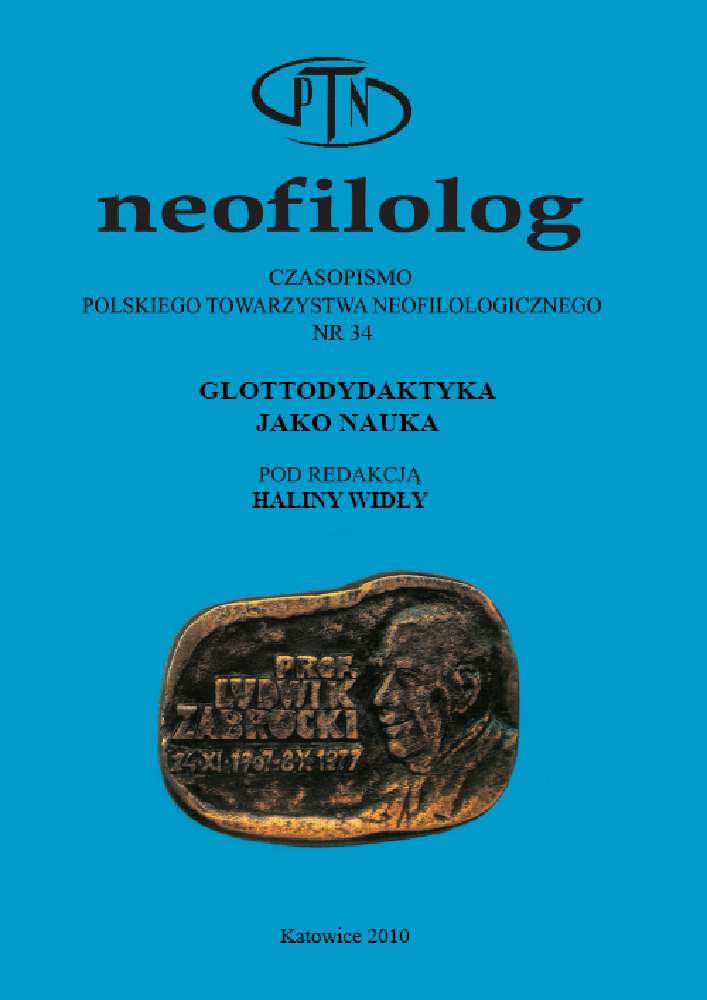Résumé
The purpose of the article is to draw attention to the specific nature of pedagogical research carried out in research groups represented by people in late adulthood. On the basis of the characteristics of the last stage of a person’s development, the author attempts to indicate such research methods and techniques and such an approach to them as will enable the optimization of broadly understood research upon the process of foreign language learning by elderly people.
Références
Bauman, T. 2001. „Strategie jakościowe w badaniach pedagogicznych”, (w) Pilch, T., Bauman, T. 2001. Zasady badań pedagogicznych. Strategie ilościowe i jakościowe. Warszawa: Wydawnictwo Akademickie „Żak”, s. 267 – 362.
Harwas-Napierała, B., Trempała, J. (red.) 2005. Psychologia rozwoju człowieka. Charakterystyka okresów życia człowieka. Warszawa: Wydawnictwo Naukowe PWN.
Klimowicz, G., Dębska, A. 2006. Program Socrates w Polsce. Efekty współpracy 1998 – 2006. Warszawa: Fundacja Rozwoju Systemu Edukacji.
Zielona Księga 2005. Wobec zmian demograficznych: nowa solidarność między pokoleniami. Bruksela: Komisja Europejska.
Kolanowska, E. i in. 2007. Program Socrates Grundtvig w Polsce w latach: 2000-2005. Akcje scentralizowane. Warszawa: Fundacja Rozwoju Systemu Edukacji.
Krüger, H.-H. 2007. Metody badań w pedagogice. Gdańsk: Gdańskie Wydawnictwo Psychologiczne.
Łobocki, M. 2006. Metody i techniki badań pedagogicznych. Kraków: Oficyna Wydawnicza „Impuls”.
Łobocki, M. 2007. Wprowadzenie do metodologii badań pedagogicznych. Kraków: Oficyna Wydawnicza „Impuls”.
Maszke, A.W. 2008. Metody i techniki badań pedagogicznych. Rzeszów: Wydawnictwo Uniwersytetu Rzeszowskiego.
Palka, S. 2006. Metodologia. Badania. Praktyka pedagogiczna. Gdańsk: Gdańskie Wydawnictwo Psychologiczne.
Pilch, T. 2001a. „Filozoficzne i pragmatyczne pojęcia badań empirycznych”, (w) Pilch, T., Bauman, T. 2001. Zasady badań pedagogicznych. Strategie ilościowe i jakościowe. Warszawa: Wydawnictwo Akademickie „Żak”, s. 15 – 69.
Pilch, T. 2001b. „Strategie ilościowe w badaniach pedagogicznych”, (w) Pilch, T., Bauman, T. 2001. Zasady badań pedagogicznych. Strategie ilościowe i jakościowe. Warszawa: Wydawnictwo Akademickie „Żak”, s. 70 – 266.
Rubacha, K. 2008. Metodologia badań nad edukacją. Warszawa: Wydawnictwa Akademickie i Profesjonalne.
Straś-Romanowska, M. 2005. „Późna dorosłość. Wiek starzenia się”, (w) Harwas-Napierała, B., Trempała, J. (red.). 2005. Psychologia rozwoju człowieka. Charakterystyka okresów ż ycia człowieka. Warszawa: Wydawnictwo Naukowe PWN, s. 263 – 292.
Szarota, Z. 2004. Gerontologia społeczna i oświatowa. Zarys problematyki. Kraków: Wydawnictwo Naukowe Akademii Pedagogicznej.
Szatur-Jaworska, B., Błędowski, P., Dzięgielewska, M. 2006. Podstawy gerontologii społecznej. Warszawa: Oficyna Wydawnicza ASPRA-JR.
Wiatrowski, Z. 2003. „Kształcenie ustawiczne dorosłych”, (w) Pilch, T. (red.). 2003. Encyklopedia Pedagogiczna XXI wieku. Tom II: G-Ł, Warszawa: Wydawnictwo Akademickie „Żak”, s. 903 – 910.
Licence
© Anna Jaroszewska 1970

Ce travail est disponible sous licence Creative Commons Attribution - Pas de Modification 4.0 International.
Auteurs :
Les auteurs de textes acceptés pour publication dans la revue Neofilolog sont tenus de remplir, signer et renvoyer à l'adresse de la rédaction, un accord sur l'octroi d'une licence gratuite pour les œuvres, avec obligation d'accorder une sous-licence CC.
En vertu de cet accord, les auteurs des textes publiés dans la revue Neofilolog accordent à l'Université Adam Mickiewicz de Poznań une licence non exclusive et gratuite et permettent l'utilisation de la sous-licence Creative Commons Attribution-NoDerivatives 4.0 International (CC BY-ND 4.0).
Les auteurs se réservent le droit de disposer librement de l'œuvre.
Utilisateurs :
Les utilisateurs d'Internet intéressés ont le droit d'utiliser les œuvres publiées à partir de l'année 2017 sous réserve des conditions suivantes :
- reconnaissance de la qualité d'auteur - l'obligation de fournir des informations sur la qualité d'auteur, le titre, la source (liens vers l'œuvre originale, DOI) et la licence, ainsi que l'œuvre distribuée ;
- sans créer d'œuvres dérivées - l'œuvre doit être conservée dans sa forme originale, p. ex. les traductions ou les interprétations ne peuvent être distribuées sans le consentement de l'auteur.
Tous les textes publiés sont soumis au droit d'auteur.
Autres :
L'Université Adam Mickiewicz de Poznań se réserve le droit à la revue dans son ensemble (mise en page, forme graphique, titre, conception de la couverture, logo, etc.).
.
